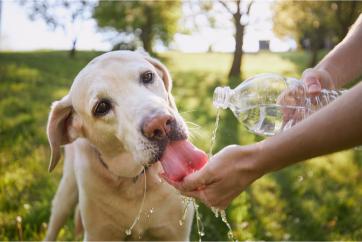Beat the Heatwave: Expert Advice for Ensuring Your Dog’s Safety in Summer

If you’re like the millions of other pet owners out there, your summer calendar is chock full of activities and events. Camping, block parties, weddings, baseball games, beach-going, hiking, concerts, parades, and firework shows add so much splendor to an already lovely season. While a pet might love to revel in all the season has to offer, the guardrails that keep them safe and healthy must continue to stand at attention. When it comes to problems related to the weather and seasonal activities, prevention is the key.
How Hot Is “Too Hot”?
There is no one-size-fits-all approach to summer pet safety. However, if the temperature is too hot for you to withstand and/or walk outside without shoes, it’s definitely too hot for your pet to endure for long.
Risk factors that impact a pet’s ability to tolerate include:
- Age
- Breed (brachycephalic breeds are at an increased risk of breathing difficulties in hot weather)
- Weight
- Medical history
- Coat style
With these in mind, be sure to apply caution when temperatures soar over 80 degrees Fahrenheit. Only exercise in the early morning and evening hours, take frequent breaks in the shade, and monitor your pet’s behavior for any signs of dehydration and/or overheating.
Water Consumption
Pets need a minimum of one ounce of water per pound of body weight every day. During high levels of exertion and on very hot days, it may be a good idea to watch how much water they consume. Always carry fresh water when outdoors and try out any of these options to increase their thirst drive:
- Pet frozen treats
- Flavored ice cubes
- Frozen Kongs or other food puzzles
- Drinking fountain
- Pet pool or sprinkler
If swimming or wading is something your pet has enthusiasm for, be sure to closely supervise them, and invest in a good life jacket.
Recognizing Heat Stroke in Pets
Unless dealt with right away, heat stroke can be very dangerous and even fatal. Please watch for the following red flags, and notify us for urgent care:
- Uncontrollable panting
- Breathing difficulty
- Drooling (thick, ropey, or sticky saliva)
- Bright red gums and tongue
- Vomiting or diarrhea
- Loss of coordination
- Lethargy or weakness
- Seizures
- Collapse
- Loss of consciousness
Apply lukewarm compresses to the abdomen, chest, back, armpits, and groin. Move them to a cool, well-ventilated, dim location. If you are unable to bring their internal body temperature down, seek emergency care. Intravenous fluids, oxygen, and hospitalization may be required to stabilize them.
Know Their Limits
Many pets want to continue playing or working out even if it’s to their own detriment. Owners should be able to identify when their pet has had enough, and attempt to distract them from working so hard. Delicious frozen treats can be a wonderful way to reset during the summer and inspire a little rest in the shade.
If you have any questions this summer about your pet’s health and behavior, please call us at (916) 726-2334. Sunrise Boulevard Animal Hospital is always here to help you and your pet.
